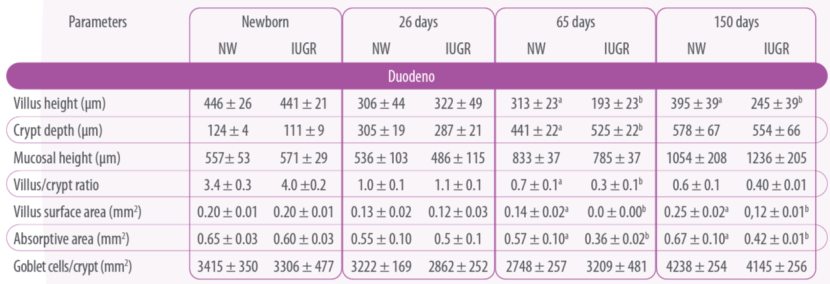Nutrient deprivation during intrauterine stage could alter fetal metabolism, leading to permanent changes in body structure, function and metabolism.
Gut health has been a term extensively used lately. However, its definition is still unclear. In humans, gut health is initially related to inflammatory diseases. On the other hand, the focus on pigs is based on disease prevention and performance maximization, through nutrient utilization and growth efficiency.
 Gut health is influenced by several factors. Among them, injury during prenatal stage, compromising fetal development, can be considered the primary damage source.
Gut health is influenced by several factors. Among them, injury during prenatal stage, compromising fetal development, can be considered the primary damage source.
There is evidence that inadequate nutrition and limited uterine capacity would be the main injury capable of compromising fetal development in swine species.
In this context, nutrient deprivation during intrauterine stage could alter fetal metabolism, leading to permanent changes in body structure, function and metabolism.
 Advances in genetic improvement in pig farming have provided the generation of females with high reproductive performance, capable of conceiving numerous litters.
Advances in genetic improvement in pig farming have provided the generation of females with high reproductive performance, capable of conceiving numerous litters.
This fact provided an increase in the number of conceptuses (fetuses and their membranes), but the uterus size did not follow this increase, making the uterine space and placental efficiency limited.
Piglets with low birth weight can represent up to 30% of a litter and are considered the main cause of reduced neonatal survival, including postnatal growth delay.

 In pigs, the main cause of low birth weight is intrauterine growth restriction (IUGR), a condition in which the fetus does not reach its growth potential due to placental insufficiency. Therefore, in this species IUGR occurs naturally and severely.
In pigs, the main cause of low birth weight is intrauterine growth restriction (IUGR), a condition in which the fetus does not reach its growth potential due to placental insufficiency. Therefore, in this species IUGR occurs naturally and severely.
In an adverse uterine environment, one of the fetal survival strategies is the redirection of blood flow to the brain to the detriment of organs such as small intestine, which compromises its normal development. This condition contributes to permanent low weight and the development of enteric diseases, increasing medication intensity and associated costs.
![]() In this regard, in order to maximize the growth of these animals, the nutritional demand has been high at all growth stages. However, it is still necessary to expand the knowledge about the digestive and immunological capacity of the small intestine in piglets affected by IUGR in the different phases of production cycle
In this regard, in order to maximize the growth of these animals, the nutritional demand has been high at all growth stages. However, it is still necessary to expand the knowledge about the digestive and immunological capacity of the small intestine in piglets affected by IUGR in the different phases of production cycle
GATROINTESTINAL SYSTEM DEVELOPMENT IN THE SWINE SPECIES
Gastrointestinal tract development in mammals is influenced both by genetic and hormonal factors and by the transition from parenteral nutrition to enteral nutrition after birth. Gut maturation is particularly fast during the perinatal period, being induced by nutrients and bioactive molecules present in colostrum and milk, which are primarily absorbed by enterocytes.

These cells have the function of absorbing proteins from the amniotic fluid, colostrum and macromolecules such as hormones, immunoglobulins and growth factors. This is particularly important for pigs, as its placenta does not allow immunoglobulins to be transferred to the fetus during pregnancy.
In the first weeks of life, gut undergoes important changes:
- Increased blood flow to the mucosa and reduced basal vascular resistence
- Accumulation of colostrum proteins in enterocytes
- Increase in mitosis of these cells and inhibition of their death.
This process is strictly associated with the gut maturation, in other words, the change to an adult type of digestion and absorption.
Gut maturation also includes marked changes in the relative weight of the small intestine, brush border enzyme activity, as well as ion and nutrient transport capacity, such changes being mediated in part by dietary alteration.
 In addition to dietary stimulation, a temporary increase in circulating cortisol levels after weaning plays an important role in the gut biochemical maturation.
In addition to dietary stimulation, a temporary increase in circulating cortisol levels after weaning plays an important role in the gut biochemical maturation.
The swine domestication slowed down the structural and functional development of the gastrointestinal tract mucosa, with early weaning being a major contributor to this fact. Under commercial conditions, the weaning transition implies sudden changes in the diet from sow milk to feed. Moreover, abrupt separation from the sow and moving to a new environment at a younger age than would otherwise be the case under natural conditions causes great physiological stress.
In pigs, early weaning contributes to numerous gut physiological dysfunctions, such as:
- Reduction of mitotic activity in crypts,
- Increased enterocyte death
- Slower replacement of immature enterocytes to adult type, and
- Modification of brush border enzyme profile.
CONSEQUENCES OF RIUC FOR THE SMALL INESTINE DEVELOPMENT

Several studies have shown that RIUC can impair the duodenum, jejunum, and ileum development in pigs from birth to adulthood. Piglets affected by RIUC have lower weight and length of the small intestine, which may be a consequence of a lower expression of growth hormone (GH) receptor in the mucosa.

The gut mucosa integrity is affected by RIUC and consequently impairs the microbiota colonization. For example, alterations in the bacteria quantification of the genera Firmicutes, Proteobacteria, Ruminococcaceae, Lactobacillus and Ochrobactrum in the small intestine were associated to RIUC in pigs in the growing phases and may serve as a future target for the gut microbiota intervention in these animals. In this group, reduced cecal microbial diversity and bacterial fermentation in the large intestine were also observed during the growth phase.
Newborn piglets affected by this condition showed a reduction in the intestinal absorption area. A smaller mucosal thickness, deeper crypts and a lower villus height / crypt depth ratio were observed. However, even with structural changes, no changes were observed in enzymatic activity (Table 1).

Table 1. Histomorphometric parameters of the small intestine in pigs with normal birth weight (NW) and affected by intrauterine growth restriction (IUGR) at different production cycle stages. ab Means in the same row with different letters differ (P < 0.05).
On the other hand, in 65-day-old piglets, the enzymatic activity of chymotrypsin was reduced, with a reduction in the enzymatic activity of amylase being observed in 150-day-old animals (Table 2).
Therefore, they are animals that present performance problems due to the impairment of carbohydrate and protein digestion, the main diet components in these phases of the production cycle.

Table 2. Specific enzymatic activity of small intestine enzymes from normal birth weight (NW) pigs and affected by intrauterine growth restriction (IUGR) at different stages of the production cycle. ab Means in the same row with different letters differ (P < 0.05).
 Recent studies indicate that, in addition to the structural and functional damage, there is an immunological impairment of the small intestine. For example, after weaning, piglets affected by RIUC increased the expression of factors that favor the inflammatory process compared to siblings born with normal weight.
Recent studies indicate that, in addition to the structural and functional damage, there is an immunological impairment of the small intestine. For example, after weaning, piglets affected by RIUC increased the expression of factors that favor the inflammatory process compared to siblings born with normal weight.
Thus, the limitation of immunological and digestive processes can predispose to the development of metabolic diseases, high morbidity and mortality. It is also considered that the morphophysiological and inflammatory changes in the small intestine are one of the main contributors to the decline in performance of animals affected by RIUC throughout their postnatal life.[/cadastrar]
Can intrauterine stage influence the gastrointestinal development of pigs?










